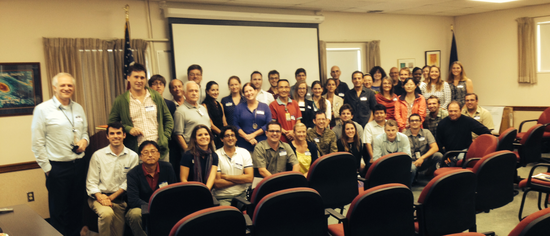2nd AOML-SEFSC workshop
AOML - SEFSC continued collaborative success: Now and in the future
9:00 to 4:30 pm on May 29, 2014
SEFSC conference room
Miami, Florida
Scientists from NOAA's Atlantic Oceanographic and Meteorological Laboratory (AOML) and Southeast Fisheries Science Center (SEFSC) met for a one-day workshop on May 29, 2014 from 9:00 am to 4:30 pm in the SEFSC large conference room.

Approximately 50 people attended the workshop, including several invited guests from the University of Miami's Rosenstiel School of Marine and Atmospheric Science (RSMAS), Harbor Branch Oceanographic Institution (HBOI), and Florida International University (FIU). A total of 19 scientific presentations divided into three sessions: Programmatic, Observations, and Numerical Modeling, were made focused primarily on the Gulf of Mexico, South Florida, and Caribbean Sea. Topics included ecosystem-based science, coral reef research, fisheries oceanography, red tides, climate-ecosystem interactions, coupled biophysical modeling, and many others. One-page summaries of each of the presentations and pdf files for many of the presentations are available below.
Following the presentations, a discussion of potential future research directions and partnerships took place.
Some of the ideas for new collaborative endeavors that were discussed included:
- Develop new engineering technologies, such as shallow water drifters and gliders to monitor the drift trajectories of key larval fish species
- Add plankton and larval fish sampling to AOML's hydrographic monitoring cruises (e.g., Florida Current, Western Boundary currents, tropical Atlantic)
- Take advantage of AOML's new glider observations to enhance ecosystems assessments
- Assess/fill gaps in existing physical observations of coastal ecosystems to generate baseline values of parameters associated with the spawning habitat and recruitment success of critical fish, invertebrates, and benthic species
- Increase efforts to develop successful, fully-coupled, high resolution biogeophysical models that include data assimilation and predictive capabilities (e.g., seasonal predictions of red tide) and begin ground-truthing them against existing empirical data
This workshop followed the first AOML-SEFSC workshop which was held in 2009 (see 1st Workshop). The 2014 workshop was considered a success by all who attended, and interest was shown in holding such joint workshops on a more regular basis.
Agenda, Summaries and Presentations
Workshop Agenda - [pdf]
Summaries and pdfs of the presentations are available for most presentations.
| 9:00 am | Coffee and muffins available in conference room |
| 9:30 am | Welcome (Libby Johns, AOML) |
Opening remarks
| 9:35 am | Alan Leonardi (Deputy Lab Director, AOML) |
| 9:40 am | Theo Brainard (Deputy Director, SEFSC) |
Programmatic Theme
| 9:45 am | Ecosystem-based science in south Florida Chris Kelble (AOML) - [Summary] [Presentation] |
| 10:00 am | The Gulf of Mexico Integrated Ecosystem Assessment: Progress and vision Michael Schirripa (SEFSC) - [Summary] [Presentation] |
| 10:15 am | Update on AOML's coral activities Jim Hendee (AOML) - [Summary] [Presentation] |
| 10:30 am | An overview of scientific diving operations between SEFSC and AOML Jack Javech (SEFSC) |
| 10:45 am | NOAA's Coral Reef Conservation Program's National Coral Reef Monitoring Plan Jennifer Schull (SEFSC) - [Summary] [Presentation] |
| 11:00 am | Morning Break |
Observations Theme
| 11:15 am | Evidence of climate-driven ecosystem reorganization in the Gulf of Mexico Mandy Karnauskas (SEFSC) - [Summary] [Presentation] |
| 11:30 am | Collaborations between AOML and the NOAA-SEFSC Early Life History Lab: Past, present, and future Barbara Muhling (SEFSC/CIMAS) - [Summary] [Presentation] |
| 11:45 am | Amazon River water in the northeastern Caribbean Sea and its effect on larval reef fish assemblages during April 2009 Libby Johns (AOML) - [Summary] [Presentation] |
| 12:00 pm | Fisheries oceanography during the Deepwater Horizon oil spill Ryan Smith (AOML) - [Summary] [Presentation] |
| 12:15 pm | Lunch (box lunches from Panera will be provided in the conference room) |
| 12:45 pm | Physical oceanography of coral reefs and other shelf-break ecosystems - a joint CIMAS/KML/NOAA effort Lew Gramer (CIMAS/AOML/FIO/USF/KML) - [Summary] [Presentation] |
| 1:00 pm | Satellite derived indices of red tide in the Eastern Gulf of Mexico and groupers John Walter (SEFSC) - [Summary] [Presentation] |
| 1:15 pm | The variability of preferred spawning grounds for bluefin tuna in the Gulf of Mexico during 1993-2011 Ricardo Domingues - [Summary] [Presentation] |
| 1:30 pm | Inferring the movements of marine animals from satellite telemetry, Lagrangian drifters and ocean circulation models Nathan Putman (SEFSC) - [Summary] [Presentation] |
| 1:45 pm | Ecosystems approach to assess multispecies fisheries risks from exploitation and environmental changes Jiangang Luo (RSMAS) - [Summary] [Presentation] |
| 12:15 pm | Afternoon Break |
Modeling Theme
| 2:15 pm | Quantifying Florida Bay habitat suitability under climate change scenarios Kelly Kearney (CIMAS/AOML) - [Summary] [Presentation] |
| 2:30 pm | SEFSC-AOML biogeochemical modeling project overview Sang-Ki Lee (CIMAS/AOML) - [Summary] [Presentation] |
| 2:45 pm | SEFSC-AOML biogeochemical modeling update Yanyun Liu (CIMAS/AOML/SEFSC) - [Summary] [Presentation] |
| 3:00 pm | Biological applications of Lagrangian Coherent Structures (LCSs) Josefina Olascoaga (RSMAS) - [Summary] |
| 3:15 pm | Regional ocean models for the U.S. Caribbean islands and Florida Bay Laurent Cherubin (HBOI) - [Summary] [Presentation] |
| 3:30 pm | Discussion on future AOML-SEFSC collaborations |
| 4:30 pm | Closing Remarks (Barb Muhling, SEFSC/CIMAS) |